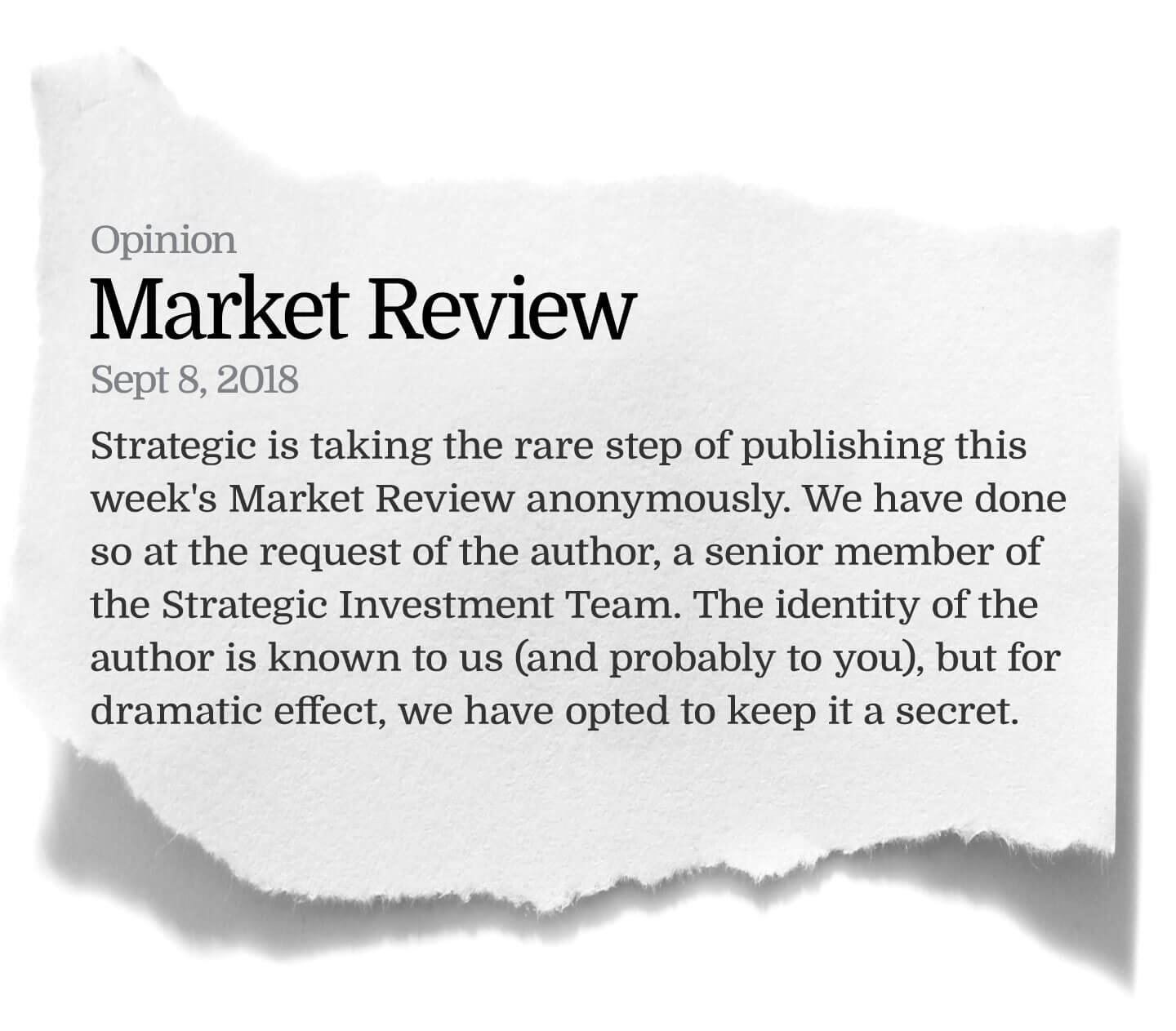Resistance is Not Futile

An “anonymous” contributor discusses the importance of resisting the allure of glamorous high-flying expensive stocks…
Market Review

Inside the Strategic Mind
I am writing from inside the Strategic Investment Team where a resistance persists – a resistance to overly expensive stocks. Large-cap companies such as Amazon (AMZN) and Netflix (NFLX) have seen their public shares balloon pushing up overall market performance. While we admit there is a certain undeniable quality to these names, it has been a leap of faith for investors to put money into these businesses where valuation far exceeds current fundamentals. While the average market forward PE (price to earnings) multiple is currently 17x, both Amazon and Netflix are about five times more expensive with a PE around 90x!
Expensive stocks were tested this week. The news on trade and tariffs was negative as no deal was reached with Canada, and $200bn in Chinese tariffs are looming. In addition, Technology stocks were in the spotlight as the Senate questioned some of the industries biggest names about their platforms. Not only did stocks fall, but Technology was one of the worst performing sectors.
Our contention is not that this is the beginning of the end for the exceptional cannonball run in Tech stocks. Maybe it is, and maybe it is not. Instead, we make the point that there are segments of the market that are very expensive, and with excess valuation comes excess risk. Historically, we have witnessed that when stocks get too expensive, minor negative headlines can have an outsized impact on share price moves. When they fall, opportunities may open up.
Our investment process is our lodestar. The goal is to find investments that are both good quality and good value. At times in the economic cycle this approach will outperform and at times it will not. Over a full cycle, however, we believe this approach pays off for well-disciplined investors.
One Week Tech Performance
The S&P 500 Information Technology sector has been one of the stars of the year, but had a tough week, falling 2.7%.
Strategy Update
Contributed by Max Berkovich ,
STRATEGIC ASSET ALLOCATION
The Duke of Hazard
It was a humbling week for U.S. equity markets, retreating from all-time highs. Value stocks were able to dodge the market’s decline, finishing slightly higher this week. Emerging markets took the most heat this week, declining over 3%. Speaking of Emerging markets…
- The allocation to China in the Emerging Markets MSCI Index is about 30%. The trade war with China is not helping Chinese equity markets, which are down over 10% year-to-date.
- Currency declines in Brazil, Russia, India, Argentina, and Turkey are major contributors to the Emerging Markets Index decline. For example, MSCI India is up over 7% when measured in local currency but down over 4% when measured in USD.
- China is the biggest risk for the Emerging Markets Indexes. If U.S. and China fail to strike a trade deal, the Chinese economy will take a hit. Foreign capital will leave the country, and China’s massive debt can become substantially bigger. China’s current national debt is estimated at over 400% of Gross Domestic Product.
- China has also used its economic heft to move its operations to even cheaper places in Asia. Any economic weakness in the Middle Kingdom will certainly be a hazard for other Asian countries.
STRATEGIC GROWTH
Dell-iverance
Consumer Staples was the leading sector, despite a lackluster business update from Mondelez (MDLZ). The Energy and Materials sectors were the laggards, despite an ugly week for Technology, especially the semiconductor holdings. Speaking of Technology…
- Dell Technologies Inc. (DVMT) reported earnings this past week. While the stock is a tracking stock for VMware (VMW) right now, it is being acquired by Dell (more on this in the July 9-13 Insights issue A Second Wind). Dell was able to grow revenue 18% year over year. Infrastructure Solutions grew revenue by 24% for the year, and Client Solutions grew by 13%. Also, Dell was able to reduce debt by $3.2 Billion this quarter, bringing a 2-year total of debt paid off to $13.7 Billion.
STRATEGIC EQUITY INCOME
The Longest Yard
The Energy sector was the biggest laggard; Health Care was the leader. Speaking of health care…
- CVS Health Corp. (CVS) received a dose of good news this week. The final yard is in sight for its acquisition of health insurer Aetna (AET). The Wall Street Journal published a story claiming that the U.S. Department of Justice is within days of providing anti-trust approval for the $70 Billion acquisition. CVS will, according to the story, be asked to divest itself of some Medicare drug plan business. According to a Wells Fargo report, CVS has 6.11 Million Medicare part D subscribers, while Aetna has 2.11 Million. The two combined would have almost 35% more subscribers than the next closest rival.
Another wild RIDE is in store for next week
Rosh Hashanah, the celebration of the Jewish New Year, will begin this Sunday night.
- We would like to wish our clients and friends a healthy and happy 5779. L’shana Tovah!
Inflation data, via the Consumer Price Index (CPI) and Producer Price Index (PPI), will be released on Wednesday and Thursday.
- Economists estimate a slight increase in prices for August.
Decision on interest rates from the European Central Bank (ECB) and the Bank of England (BoE) will be announced on Thursday morning.
- The ECB is facing pressure from Austria to hike rates, but Mario Draghi is committed to no rate hikes for the foreseeable future.
- The BoE decision will be overshadowed by BREXIT and the plans of the current President of the bank, Carney, whose term expires in June.
Economic releases including Industrial Production, Retail Sales, Beige Book, JOLTS and the University of Michigan Consumer Sentiment Survey may impact U.S. equity markets.
| Indices & Price Returns | Week (%) | Year (%) |
|---|---|---|
| S&P 500 | -1.0 | 7.4 |
| S&P 400 (Mid Cap) | -0.9 | 6.6 |
| Russell 2000 (Small Cap) | -1.7 | 11.4 |
| MSCI EAFE (Developed International) | -2.4 | -6.7 |
| MSCI Emerging Markets | -3.6 | -12.1 |
| S&P GSCI (Commodities) | -1.9 | 3.9 |
| Gold | -0.3 | -8.5 |
| MSCI U.S. REIT Index | -1.3 | 1.0 |
| Barclays Int Govt Credit | -0.4 | -2.1 |
| Barclays US TIPS | -0.8 | -2.5 |
About Strategic
Founded in 1979, Strategic is a leading investment and wealth management firm managing and advising on client assets of over $2 billion.
OverviewDisclosures
Strategic Financial Services, Inc. is a SEC-registered investment advisor. The term “registered” does not imply a certain level of skill or training. “Registered” means the company has filed the necessary documentation to maintain registration as an investment advisor with the Securities and Exchange Commission.
The information contained on this site is for informational purposes and should not be considered investment advice or a recommendation of any particular security, strategy or investment product. Every client situation is different. Strategic manages customized portfolios that seek to properly reflect the particular risk and return objectives of each individual client. The discussion of any investments is for illustrative purposes only and there is no assurance that the adviser will make any investments with the same or similar characteristics as any investments presented. The investments identified and described do not represent all of the investments purchased or sold for client accounts. Any representative investments discussed were selected based on a number of factors including recent company news or earnings release. The reader should not assume that an investment identified was or will be profitable. All investments contain risk and may lose value. There is no assurance that any investments identified will remain in client accounts at the time you receive this document.
Some of the material presented is based upon forward-looking statements, information and opinions, including descriptions of anticipated market changes and expectations of future activity. Strategic Financial Services believes that such statements, information, and opinions are based upon reasonable estimates and assumptions. However, forward-looking statements, information and opinions are inherently uncertain and actual events or results may differ materially from those reflected in the forward-looking statements. Therefore, undue reliance should not be placed on such forward-looking statements, information and opinions.
No content on this website is intended to provide tax or legal advice. You are advised to seek advice on these matters from separately retained professionals.
All index returns, unless otherwise noted, are presented as price returns and have been obtained from Bloomberg. Indices are unmanaged and cannot be purchased directly by investors.

 Michael Leist
Michael Leist